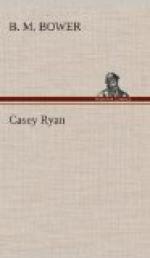“They didn’t,” Casey cut in trenchantly. “They went dim because I was taking her slow, being about all in.”
The foreman grinned. “We thought you’d drove into the crevice, and we went down with lanterns and hunted the full length of it. We never found a sign of you or the car—”
“’Cause I was over in camp, or thereabouts,” interpolated Casey drily. “I wish you’d of come on over. I sure needed help.”
“We figured you was pretty well lit up, to circle around like that. I’ve been down since, by daylight, and so have some of the boys, looking into that crevice. But we gave it up, finally.”
Then Casey, because he liked a joke even when it was on himself, told the foreman and his men what had happened to him. He did not exaggerate the mishap; the truth was sufficiently wild.
They whooped with glee. Every one laughs at the unusual misfortunes of others, and this was unusual. They stood around the Ford and talked to it, and whooped again. “You sure must have had so-ome jag, Casey,” they told him exuberantly.
“I was sober,” Casey testified earnestly. “I’ll swear I hadn’t a drop of anything worse than lemon soda, and that was before I left town.” Whereupon they whooped the louder, bent double, some of them with mirth.
“Say! If I was drunk that night, I’d say so,” Casey exploded finally. “What the hell—what’s the matter with you rabbits? You think Casey Ryan has got to the point where he’s scared to tell what he done and all he done? Lemme tell yuh, anything Casey does he ain’t afraid to tell about! Lyin’ is something I never was scared bad enough to do. You ask anybody.”
“There’s the widow,” said the foreman, wiping his eyes.
Casey turned and looked, but the widow was not in sight. The foreman, he judged, was speaking figuratively. He swung back glaring.
“You think I’m scared to tell her what happened? She’ll know I was sober if I say I was sober. She ain’t as big a fool—” He did not want to fight, although he was aching to lick every man of them. But for one thing, he was too sore and lame, and then, the widow would not like it.
With his neck very stiff, Casey limped down to the house and tried to tell the widow. But the widow was a woman, and she was hurt because Casey, since he was alive and not in the crevice, had not come straight to comfort her, but had lingered up there talking and laughing with the men. The widow had taken Casey’s part when the others said he must have been drunk. She had maintained, red-lidded and trembly of voice, that something had gone wrong with Casey’s car so that he couldn’t steer it. Such things happened, she knew.
Well, Casey told the widow the truth, and the widow’s face hardened while she listened. She had permitted him to kiss her when he came in, but now she moved away from him. She did not call him dear boy, nor even Casey dear. She waited until he had reached the point that puzzled him, the point of a Ford’s degree of intelligence. Then her lips thinned before she opened them.




